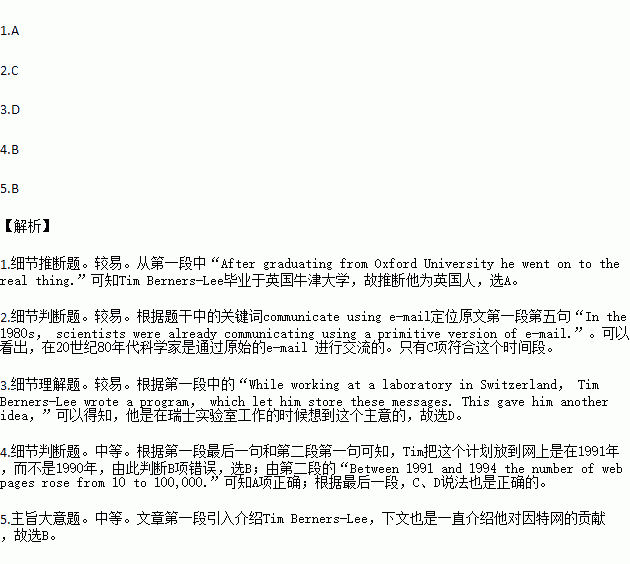题目内容
Tim Berners-Lee is the man who wrote the software program that led to the foundation of the World Wide Web. Britain played an important part in developing the first generation of computers. The parents of Tim Berners-Lee both worked on one of the earliest commercial (商业的) computers and talked about their work at home. As a child he would build models of computers from packing material. After graduating from Oxford University he went on to the real thing. In the 1980s, scientists were already communicating using a primitive version of e-mail. While working at a laboratory in Switzerland, Tim Berners-Lee wrote a program, which let him store these messages. This gave him another idea: write a program that will let academics(学术界人士) from across the world share information on a single place. In 1990 he wrote the HTTP and HTML programs which form the basis of the World Wide Web.
The next year his programs were placed on to the Internet. Everyone was welcome to use them and improve them if they could. Programmers used this codes(密码) to work with different operating systems. New things like web browsers(浏览器) and search engines were developed. Between 1991 and 1994 the number of web pages rose from 10 to 100,000.
In 1994 Tim Berners-Lee formed the newly formed World Wide Web consortium(协会), or W3C. More than 200 leading companies and laboratories are represented by W3C. Together they make sure that everyone can share equally on the web. “The Web can help people to understand the way that others live and love. It helps us understand the humanity of people.” he says.
1.From the passage, we can infer that Tim Berners-Lee is .
A. British B. American
C. Swiss D. French
2.Scientists began to communicate using e-mail .
A. in 1980 B. after the 1980s
C. before 1990 D. in the 1960s
3.Tim Berners-Lee decided to write a program that would let academics from across the world share information on a single place when .
A. he was a child
B. he studied in Oxford University
C. he formed W3C
D. he worked at a lab in Switzerland
4.Which of the following is NOT true?
A. The number of web pages rose rapidly in the 1990s.
B. Tim’s programs were placed on to the Internet in 1990.
C. The World Wide Web will have an effect on the social development.
D. Tim Berners-Lee made a great contribution to the computer science.
5.The passage is mainly about .
A. when the Internet came into being
B. who Tim Berners-Lee is
C. why computers develop so rapidly
D. how the World Wide Web started
 黄冈天天练口算题卡系列答案
黄冈天天练口算题卡系列答案
